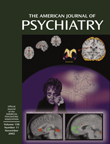Tardive Dyskinesia With Risperidone and Anticholinergics
To the Editor: The following are reports on three Japanese women who developed early-onset tardive dyskinesia during short-term risperidone treatment while taking an anticholinergic agent. All three met DSM-IV criteria for schizophrenia but not for mood disorders.
Ms. A, a 40-year-old woman who had never taken psychotropics, developed dysarthria and salivation 2 months into risperidone treatment (3–6 mg/day). Although this was resolved within 2 weeks by the addition of biperiden (3 mg/day), Ms. A’s lips and jaw showed signs of moderate dyskinesia. Risperidone administration was then gradually terminated over 2 weeks and replaced with olanzapine (7.5 mg/day), which was increased to 10 mg/day 2 weeks later. The symptoms of dyskinesia disappeared 23 days after the discontinuation of risperidone and have not reappeared since (5 months to date).
Ms. B was a 28-year-old woman who also had no prior experience with psychotropics. Initially treated with amoxapine (an average of 125 mg/day), she was given risperidone (2 mg/day), which was titrated to 9 mg/day over 7 days. Three weeks later, she developed dysarthria and salivation, requiring either biperiden (6 mg/day) or trihexyphenidyl (4 mg/day). She developed dyskinesia in her lips and jaw 2 months into treatment. This was cured within 6 weeks by gradual termination of risperidone administration and replacement with quetiapine (100–200 mg/day). Ms. B has not had dyskinesia since (8 months to date).
Ms. C, a 24-year-old woman, had taken chlorpromazine (an average of 75 mg/day) and haloperidol (an average of 6 mg/day) for less than 6 weeks. Four months before the treatment, she had also experienced ECT five times. Initially, she had started with haloperidol (an average of 18 mg/day) but was then given risperidone (2 mg/day) and biperiden (2–4 mg/day) because of dysarthria and salivation. Two months later, she developed lip and tongue dyskinesia, requiring replacement of risperidone with quetiapine (150 mg/day) over 6 weeks, as in the case of Ms. B. She has not had dyskinesia since (6.5 months to date).
All patients took anticholinergic agents for extrapyramidal symptoms that were relatively limited to the perioral area. Of interest, delayed tardive dyskinesia was also observed in the same area. It is thought that anticholinergic agents diminish the atypicality of risperidone or they increase the risk of tardive dyskinesia. In the case of tardive dyskinesia induced by conventional antipsychotics, the existence of preceding extrapyramidal symptoms and the coadministration of anticholinergic agents have been recognized as risk factors (1). Patients taking conventional antipsychotics who develop severe extrapyramidal symptoms could be at particular risk of developing tardive dyskinesia, even with the use of atypical antipsychotics. Moreover, these cases suggest that early recovery can be achieved by switching to another atypical psychotic. Thus, atypical antipsychotics, reported to be useful in the treatment of tardive dyskinesia caused by conventional antipsychotics (2), may also be useful in treating tardive dyskinesia induced by atypical antipsychotics.
1. Kane JM, Smith JM: Tardive dyskinesia: prevalence and risk factors, 1959-1979. Arch Gen Psychiatry 1982; 39:473-481Crossref, Medline, Google Scholar
2. Gupta S, Mosnik, Black DW, Berry S, Masand PS: Tardive dyskinesia: review of treatments past, present, and future. Ann Clin Psychiatry 1999; 11:257-266Crossref, Medline, Google Scholar



